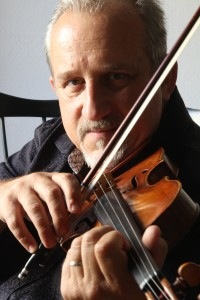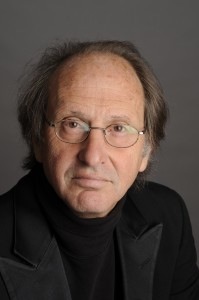A festival on the edge of the Pacific
Cross-pollination was the perfect theme for the Festival Orchestra’s opening night on Sunday, July 9, in the Big Tent on the Mendocino Headlands. The Mendocino Music Festival is currently celebrating its 31st season, and opened Saturday with two concerts: a famed classical quartet and an a cappella group whose polished arrangements are widely used.
On Sunday this multi-genre festival returned partway back to classical, but with a program that combined cultures and genres. Led by Artistic Director Allan Pollack, we were treated to a brash New Yorker sampling Havana rumba, an Argentine tango master’s tribute to Vivaldi, and a Russian colorist’s deep feeling for the scales of Baghdad. Whoa!

Pollack took the stage and immediately launched into George Gershwin’s Cuban Overture, a work of big trombones and lilting clarinets. The strings were not only exceptionally tight, but knew how to lean into the beat for some early twentieth century Cuban sass. But the total effect was diminished by poor amplification, which really shouldn’t have been used at all for that full orchestra. Nonetheless, it was a chance to blow out the carburetors for this summer’s shakedown cruise.
Their balance was restored in the next piece, Astor Piazzolla’s Four Seasons of Buenos Aires, which was a tribute to Vivaldi’s Four Seasons. Violinist and composer Jeremy Cohen was the soloist, giving us the scrubbed strings and whips for which tango is famed, along with soaring Latin cadenzas mixing it up with blistering classical arpeggios. Piazzolla’s long work was more than a tribute: it was a tango for two cultures, a dance between smoldering Argentine rhythms and the pure serenity of Vivaldi.
Orchestrated and revised by Russian composer Leonid Desyatnikov, each of the four movements is structured “fast/slow/fast” as Vivaldi had done 350 years earlier in his seminal work. Desyatnikov arranged Piazzolla’s tango quintet – written for violin, bandoneon, guitar, piano and cello – for violin and string chamber orchestra, and he also interwove more of the Baroque material. That mix of masteries was as timeless and primal as their subject, the joyous virility of spring, the long nights of summer, the storms of autumn and the dying back of winter.
Cohen delivered sour notes and sumptuous chords on his violin, and then gloried in the lowest and highest notes with ear-stretching arpeggios, matching Argentina’s passion with Vivaldi’s fierceness. The orchestra joined in a long slide and the audience applauded and cheered long at the end of the first movement… and then after each of the other three movements!
Cellist Stephen Harrison took his own heartfelt solo, slow scales of Baroque severity and Cohen returned with a cadenza that was all slither and abrupt turns, as fragile and moody as tango, then added bits of Pachelbel and another fiery cadenza, dying out with wisps from Vivaldi’s Spring. This time the audience stood.
 After intermission, Pollack led another big crowd pleaser, Nikolai Rimsky-Korsakov’s Scheherazade. This suite based on the Thousand and One Nights is instantly recognizable to most or all, from its massive opening to its gorgeous violin theme. Written by a Russian composer, this work has all of the big bones of a Tchaikovsky symphony, but drenched in the wild colorings of Berlioz and the French, and built on Arabic scales. In other words, it is as unique as it is well loved.
After intermission, Pollack led another big crowd pleaser, Nikolai Rimsky-Korsakov’s Scheherazade. This suite based on the Thousand and One Nights is instantly recognizable to most or all, from its massive opening to its gorgeous violin theme. Written by a Russian composer, this work has all of the big bones of a Tchaikovsky symphony, but drenched in the wild colorings of Berlioz and the French, and built on Arabic scales. In other words, it is as unique as it is well loved.
Concertmaster Jay Zhong excelled in the many violin solos, smooth and sweet even in the most demanding parts, and Pollack had him take his own bows afterwards. This is also nearly a concerto for orchestra, with the lively solo moving around the orchestra to feature the high caliber of this group of musicians who come together for three weeks every summer. Mindy Rosenfeld delivered the warmth and exoticism of flute, Eric Kritz cleansed our palette with cool drops of clarinet, and Carolyn Lockhart doodled through Middle-Eastern scales on high bassoon.
This is a work where the mood and tempo change frequently, and Pollack conducted it fearlessly. His musicians gave him the unity he needed and brought the full audience back to their feet.
Hearing this work in a 10,000 square foot tent on the craggy headlands overlooking the Pacific stretches something in a person, just as our eyes are stretched by that immensity. And listening to these World musics as the wind luffed the tent fabric and snapped the material around the doorways added the feeling of abandon: we were dancing on the Titanic and there is nothing like it.
Jeremy Cohen brings his own quartet to the Piedmont Center for the Arts on Tuesday, July 11, the day before press, so those readers who got to hear his blistering technique will know first hand what I heard in Mendocino.
Coming up, the Mendocino Music Festival features Band of Heathens on Thursday, Don Pasquale, a comic opera by Donizetti, on Friday, the piano duo ZOFO followed by a Big Band concert on Saturday, and much, much more. See mendocinomusic.org for complete information and tickets.
—Adam Broner
